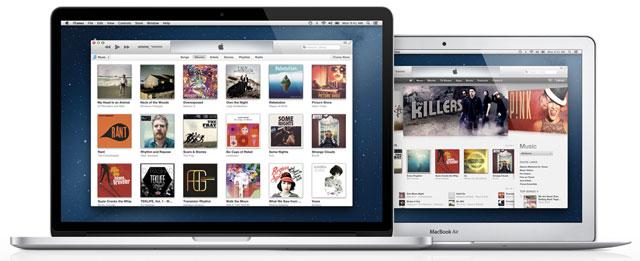Industry sources are saying that Google's willingness to acquiesce to music label demands and the structure of the hybrid service Apple is trying to build are the main reasons why the search giant's music service is live now while the iPhone maker's offering might miss WWDC.
Google rolled out All Access for Google Play Music users this week during the keynote for its I/O developer conference, beating Apple by at least weeks to what some industry players hope will be the future of music: subscription-based services. Meanwhile, Apple's status as a hardware tech giant isn't helping it as much as it would have hoped with the music labels, sources tell The Verge.
One obstacle to Apple rolling out its long-anticipated "iRadio" service is the Cupertino company's longtime resistance to paying advances to the major copyright holders. That, along with an initial lowball royalty offer to the record labels, has kept Apple's service in a holding pattern, even as the company's Worldwide Developers Conference approaches.
Instead of an up front assurance payment, Apple is said to be offering a combination of royalties per track streamed, a share of iRadio's advertising revenue, and a guaranteed minimum payment if the previous two options prove insufficient. Universal Music may have already agreed to Apple's terms, but Sony Music is thought to be the main holdout.
Google, meanwhile, is said to have agreed to pay advances in order to get its service out the door. Google's choice to hew to the path worn by services like Spotify and Rdio — that of the plain subscription service with some radio and discovery elements — is also said to be more to the music labels' liking. The labels, burnt early in the last decade by rampant file sharing, are looking to secure a steady revenue stream in exchange for their product, assuring that songwriters, engineers, publishers, and other shareholders continue to be paid.
Apple's offering, on the other hand, is reportedly more of a hybrid service, blending elements of Internet radio with other on-demand features. The licensing agreements for such a service, sources say, must be built from the ground up, and those negotiations are part of what's holding the service up.
In addition to Google's All Access, Apple's offering would join Spotify, Rdio, Microsoft's Xbox Music, and others in the new generation of music discovery and consumption sources. The record labels are encouraged by the number of options consumers have to access their product of late. iTunes may have contributed greatly to the industry's first revenue growth in years, but the labels have historically been wary of Apple's overwhelming influence on their industry.
 Kevin Bostic
Kevin Bostic







-m.jpg)






 Charles Martin
Charles Martin
 Christine McKee
Christine McKee
 Wesley Hilliard
Wesley Hilliard
 Malcolm Owen
Malcolm Owen
 Andrew Orr
Andrew Orr
 William Gallagher
William Gallagher
 Sponsored Content
Sponsored Content








41 Comments
9to5 reports a security issue with iTunes that might need patching too. Free copies of the 74 minute Daft Punk Random Access Memories that shouldn't be that easy? EDIT: I noticed that the album was streamed for free at iTunes a few days ago. Could that be at the root of it?
Google.
Google.
Would someone please ban this toolbag? They add absolutely nothing to this forum.
Of course google will acquiesce to the labels. They'll just add ads to the music and/or just mine what users are listening to and pop up ads is the user's google services.
Of course google will acquiesce to the labels. They'll just add ads to the music and/or just mine what users are listening to and pop up ads is the user's google services.
Actually that's the rumored way Apple's streaming "radio" service will work. Targeted ads with the revenue split between the content owner and Apple. Google's service on the other hand appears to be paid rather than ad-supported. Dunno for sure yet tho.
EDIT: According to several different news articles, Google will not have a free ad-supported version of it's All-Access music streaming service. If the rumor of Apple's being ad-supported turns out to be true that would be a big 'ol role-switch.
Apple data-mining to support streaming while Google sells it's music service? Nah. . .